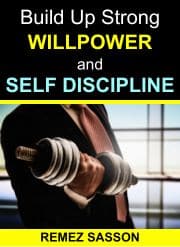
Setting goals can be a piece of cake, but accomplishing them is often easier said than done. New Year’s resolutions alone often fall by the wayside, with a Forbes Health and OnePoll survey noting that over 44% of the goals set on January 1st are abandoned by February and March. But why is it so hard to finish what you set out to do in the first place?
Leadership and mindset coach Hanane Anoua pinpoints some common reasons why achieving goals is so challenging: an inability to get started, setting vague objectives that make it difficult to monitor progress, and knowing what you want-but not being able to achieve it because you’re operating at negative energy levels.
If you’re experiencing any (or all) of the above, you may be lacking the one characteristic you need for success: grit.
Browse our online courses on meditation, positive thinking, overcoming procrastination, confidence, and freedom from distractions.
Wondering how to hone that quality for improved self-development and goal achievement? American academic and psychologist Angela Duckworth tells you what you can do in her book Grit: The Power of Passion and Perseverance. Here’s more on what her work discusses-and how you can use its insights to always finish what you set out to do.
Behind Grit: the Quality You Need to Achieve Your Goals
You don’t need talent to achieve your goals. The true secret to success? Be passionate and persistent, no matter what.
That’s what Duckworth argues in Grit-one of the top trending titles in Everand’s library of self-improvement ebooks.
The reason why it’s considered to be of the same caliber as other bestselling personal growth books like Stephen Covey’s The 7 Habits of Highly Effective People and Ray Dalio’s Principles: Life and Work is that, through Grit, Duckworth emphasizes that anyone can accomplish anything they set their mind to, regardless of where they are in life.
But what exactly is “grit?” It’s the determination and effort you put into facing the challenges and failures that hold you back along the way. Instead of relying solely on talent, genius, or even luck, cultivate the strength you need to get back up again. Soldier on toward your goals, no matter how long it takes you to reach them.
What’s great about grit is that it isn’t something you’re born with. It’s a quality you can learn-and ultimately use to improve yourself for the better.
Using Grit to Finish What You Set Out to Do
The question now is, how do you develop grit so you can finish what you set out to do? Duckworth recommends nurturing these four basics: interest, practice, purpose, and hope.
Find Your Passion
If you’re not passionate about your goals, it’ll be more challenging to achieve them, especially when you run into setbacks. Aligning your objectives with things you’re interested in will better motivate you to reach them-so be sure to do just that.
Looking to advance your career? Pick up skills you’re interested in, and they’ll lead you to a job you’ll actually be passionate about and excel in.
Duckworth uses celebrated athlete Michael Jordan as an example, noting how his love for basketball helped him focus, hone his skills, and nab the outstanding achievement of being one of the sport’s most legendary players.
Embracing your passion can even help you achieve long-term goals! Take healthy weight management. Shedding those excess pounds sustainably won’t happen overnight, which is why it can be frustrating when you don’t see visible results right away.
What will help is following some best practices for weight loss in ways that align with your preferences. Need to eat healthier? Put nutritious twists on your favorite dishes, like pizza. Have to work out more? Do so with fun activities like dancing!
Ultimately, nurturing your interest will inspire you to keep going when you reach rough patches-allowing you to develop grit and reach your goals.
Pursue Continuous Improvement
Pursuing continuous improvement allows you to slowly but surely work toward success. The best part about committing to consistent practice is that it’s a gradual process.
In fact, the first step in Duckworth’s guidelines for continuous improvement involves breaking down your goals into smaller and more achievable objectives. Doing so allows you to celebrate small wins, with each minor milestone driving you to go on and accomplish the next one.
Duckworth’s next tip is to conduct deliberate practice. Turn mistakes into lessons. If you find yourself stuck in a rut, assess the actions you’ve taken so far, see what you can do better, and develop the skills you need to make the neccessary improvements.
Finally, be consistent. In an opinion piece for EdWeek, Duckworth emphasizes that the combination of repetition and goals for improvement will lead to the ever-improving expertise you need to develop grit.
For example, students who accomplish homework in the same place and at the same time every day are more likely to achieve better academic performance.
The key takeaway here is that there is no shortcut to success. Always strive to improve yourself, no matter what, and you’ll set out what you achieve to accomplish.
Work Toward a Greater Cause
To develop grit, you need more than just the internal motivation offered by aligning your goals with your passions. You also need external inspiration, and that’s something you can achieve by connecting those same goals to a greater cause. Doing so will allow you to find a meaning and purpose that will anchor all your efforts and promote further progress.
Duckworth recommends starting by contemplating what you do in life-whether in the office or at home-and its positive impacts on society and the world at large.
Maybe you’re pursuing a career that directly uplifts the lives of others, such as social work or healthcare. Or perhaps your goal is to live a more sustainable lifestyle, in which case you’re helping mitigate the effects of the climate crisis.
Regardless of what you do, set goals that improve how you do it and ultimately boost its positive impact on others. In that way, you can further develop grit and motivate yourself to reach your objectives.
Believe in a Better Future
Though internal and external means of motivation-along with a commitment to deliberate and continuous practice-can all help develop grit, how can you maintain that grit in rough times?
After all, it can be hard to keep going when stress and anxiety hold you back. Because of this, Duckworth recommends developing one last basic: hope.
By believing in a better future for both yourself and the people who will benefit once you reach your goals, you’ll give yourself the strength to keep up your efforts, even when faced with adversity.
Stay optimistic and keep looking for that silver lining when you’re faced with tough situations. Developing and maintaining such a mindset will help you nurture the grit you need to always finish what you set out to do.
If you’ve set some goals for personal development but are finding it tough to achieve them, don’t worry-with a little bit of grit, you can get things done. Looking for more insights like this? Continue perusing our curated collection of willpower and discipline titles and tips on Success Consciousness.
About the Author
Grace Wheeler is a freelance writer whose pieces center on self-development—breaking down what it means and how it can be achieved to simplify personal growth and make it more accessible to many. In her free time, you’ll find her reading some of her own favorite self-development titles or bonding with her family, friends, and two cats.

